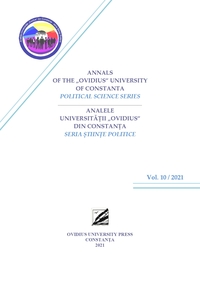EUROPEAN UNION STRATEGIC AUTONOMY IN THE CONTEXT OF THE CONFERENCE ON THE FUTURE OF EUROPE
EUROPEAN UNION STRATEGIC AUTONOMY IN THE CONTEXT OF THE CONFERENCE ON THE FUTURE OF EUROPE
Author(s): Oana CristeaSubject(s): Politics / Political Sciences, Politics, EU-Approach / EU-Accession / EU-Development, Geopolitics
Published by: Ovidius University Press
Keywords: Conference on the Future of the EU; European Union; European security; geopolitics; strategic autonomy;
Summary/Abstract: The main goal of this paper is to discuss the need for EU to achieve strategic autonomy in the upcoming years and shed light on how this concept is shaping EU’s future. The question underpinning this research is focused on the reasons why strengthening EU’s strategic autonomy matters so much in shaping said future. Strategic autonomy cannot be limited only to security and defense, as many more fields need to embed this concept in 2021. In this sense, the paper does not address directly the complementarity with NATO and the defense and security dimension of strategic autonomy, but rather focuses on the political and economic implications of EU’s strategic autonomy. Also, as more global actors begin to review their dependencies and try to identify alternatives, especially after the Covid-19 crisis, a more in-depth and a multi-pronged approach is required in relation to the geopolitical interests of external actors and their impact on creating a stronger European strategic autonomy. The paper also addresses the idea that the strategic autonomy is rather a question of survival of the European project, otherwise EU is running the risk of becoming irrelevant in the event that its “weight” and economic power in the world would diminish to worrying levels. Thirty years ago, EU represented 25% of the global wealth. It is foreseen that in 20 years, EU will not represent more than 11% of the world’s GNP, far behind China and the US. Ultimately, the paper focuses on the compelling role the EU needs to take as a global leading leader in order to protect and promote its values and interests worldwide and to address the current geopolitical challenges. There is no better starting point for this than to engage in an extensive and inclusive dialogue with the citizens about the way ahead, and the Conference on the Future of the EU seems to be the appropriate platform. The topics of the Conference included amongst other, climate change, jobs and economy, EU’s role in the world, or digitalization issues. In other words, every priority that needs to adapted to the logic of strategic autonomy and help EU build a stronger profile in the global landscape.
Journal: Annals of the Ovidius University of Constanta - Political Science Series
- Issue Year: 10/2021
- Issue No: 1
- Page Range: 69-93
- Page Count: 25
- Language: English

